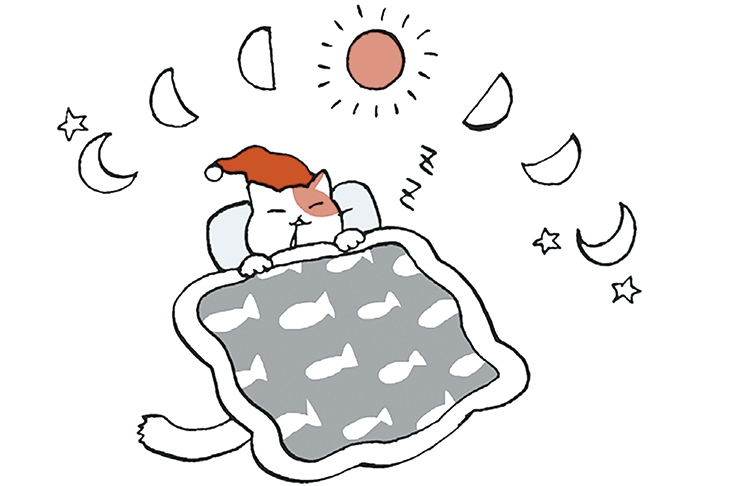We have a fine crop of Christmas gift books this year, so good that some of them actually qualify as real books. This is a rare and beautiful thing.
What Cats Want (Bloomsbury, £12.99) is by Dr Yuki Hattori, billed here as ‘Japan’s leading cat doctor’, as though anyone is going to argue with that. It’s simply a guide to understanding your cat — clear, concise, very pleasingly designed and with some lovely, quintessentially Japanese illustrations, mainly of cats. Of course, if you don’t like cats it’s really not going to help you very much; but for those of us who are at least partially obsessed by these beautiful, mysterious, bird-butchering, bum-licking creatures who don’t think they are masters of the house, but know it for certain, this is a delightful and genuinely useful little book. The illustrations, by the way, are by the unfeasibly named Ito Hamster.
‘Lalochezia’ is a Greek word meaning the use of foul language to alleviate stress, unhappiness, pain or frustration
Word Perfect (John Murray, £14.99) is the latest volume from the ferocious production line of Susie Dent, logophile, lexicographer and long-time denizen of Dictionary Corner on TV’s Countdown. For reasons known only to her and her agent, Dent has ascribed an interesting, sometimes ludicrously obscure, word to each day of the year, which means that (including 29 February) there are 366 words discussed in this book. But she writes so entertainingly and well about them that the completely spurious nature of her project soon ceases to matter. I did know that ‘maverick’ was named after an American cattle rancher who refused to brand his calves and that ‘serendipity’ came from the Old Persian name for Sri Lanka. But I didn’t know that Victorians customarily referred to handkerchieves as ‘snottingers’, that ‘acid test’ had its origins in the 1848 California gold rush or that ‘lalochezia’ is a Greek word meaning the use of foul language to alleviate stress, unhappiness, pain or frustration. (Sod that for a game of soldiers.)
If Dent is prolific, she has nothing on the extraordinary productivity of John Lloyd’s QI empire. Funny You Should Ask… (Faber, £12.99) is credited to the QI Elves, and is by my reckoning the 17th book released under the banner so far. It’s also one of the best. Every Wednesday the Elves appear on Zoe Ball’s Radio 2 breakfast show to answer questions put forward by listeners, and the oddness of the questions is matched only by the brilliance of the answers. If I have a slight problem with QI it’s that both TV show and books seem to come marinaded in their own smugness, but this one avoids that and it’s both genuinely useful and endlessly fascinating. Here’s one question: because chess has been played so many times over the centuries, has every possible game, move for move, already been played before? No, say the Elves. There are more possible games of chess than there have been seconds since the start of the universe. There is an elegance to that reply that I find very satisfying.
There are two excellent poetry anthologies in this year’s mix. Charlotte Moore’s The Magic Hour (Short Books, £12.99) is the result of her Tuesday afternoon poetry club, at which her friends choose their favourite poems and then talk about them. There are gnarled old favourites here, and a few surprises, with a high proportion of female poets you may not have heard of. But what really comes over is the great sunny enthusiasm of Moore and her mates, so that reading her book feels a little like sitting by her fireside drinking a cup of Earl Grey. In the way that all the best magazines are like clubs, of which both writers and readers feel they are members, so is this book.
Clive James compiled The Fire of Joy (Picador, £20) in the last months of his life, his vision having been impaired by surgery, leaving him unable to read. So with his wife and daughter on hand, he took it upon himself to remember the 80 poems he had loved the most, and then write the most extraordinarily cogent commentaries on each of them. I have read many old men’s books over the years, and even the best writers often lose their flavour, like chewing gum left on the bedpost overnight. But this book shows no diminution whatever of James’s talents, and it’s fuelled by his obvious love of the form and the sheer functionality of remembered verse to a dying man.
Finally, this has been an excellent year for Alex, the cartoon strip that has graced the financial pages of the Daily Telegraph since the Palaeozoic Era. I realised a while ago that almost everything I know, or think I know, about the City comes from Russell Taylor and Charles Peattie’s strip: that most jobs there are lung-crushingly boring; that everyone earns piles of money but spends more, so no one can afford to retire; that status is everything and that dinner parties are for sleeping through to show everyone how hard you work. But the pandemic meant that everyone has been working from home most of the year and the strip has simply blossomed. The Best of Alex 2020 (Masterley Publishing, £19.99) is available on Amazon and from their website, www.alexcartoon.com, and is highly recommended.






Comments